Top Virginia Expungement Lawyer VA Attorney • 1500+ Reviews
 In Virginia, an expungement is the legal process to remove a criminal arrest or charge from police and court records. The process requires petitioning the Virginia Circuit Court of the jurisdiction where you were originally charged. Expungement of police and court records is not available in cases involving a Virginia conviction. A different legal procedure called “sealing” may be available. For purposes of expungement, a conviction includes cases where the evidence was found to be sufficient for a finding of guilt even if not convicted except in cases where Va. Code §19.2-298.02 (D) applies. The existence of a criminal record may create a manifest injustice and can negatively affect your career and future – even if you were not convicted.
In Virginia, an expungement is the legal process to remove a criminal arrest or charge from police and court records. The process requires petitioning the Virginia Circuit Court of the jurisdiction where you were originally charged. Expungement of police and court records is not available in cases involving a Virginia conviction. A different legal procedure called “sealing” may be available. For purposes of expungement, a conviction includes cases where the evidence was found to be sufficient for a finding of guilt even if not convicted except in cases where Va. Code §19.2-298.02 (D) applies. The existence of a criminal record may create a manifest injustice and can negatively affect your career and future – even if you were not convicted.
***Our attorneys are licensed to practice law in all Virginia Courts***
Put our experience to work for you – Let us review your case!
30,000+ Clients Represented
1500+ Client Reviews
60+ Years of Combined Experience
Experienced Virginia Expungement Lawyers for Circuit Court Representation
 Riley & Wells Attorneys-At-Law is a prominent Virginia law firm with over 60 years of combined legal experience. Arrest records can be a hindrance to an innocent citizen’s ability to obtain employment, an education and to obtain credit. Our top rated lawyers specialize in representing clients before the Virginia Circuit Courts with the expungement and sealing of criminal records. We are recognized as a “Best Law Firm” by U.S. News & World Report. The criminal records to be expunged or sealed from police and court files may include a felony arrest or a misdemeanor charge. We have a long track record of success with expungement petitions. Our firm has been positively reviewed more than any other expungement lawyers in the Commonwealth.
Riley & Wells Attorneys-At-Law is a prominent Virginia law firm with over 60 years of combined legal experience. Arrest records can be a hindrance to an innocent citizen’s ability to obtain employment, an education and to obtain credit. Our top rated lawyers specialize in representing clients before the Virginia Circuit Courts with the expungement and sealing of criminal records. We are recognized as a “Best Law Firm” by U.S. News & World Report. The criminal records to be expunged or sealed from police and court files may include a felony arrest or a misdemeanor charge. We have a long track record of success with expungement petitions. Our firm has been positively reviewed more than any other expungement lawyers in the Commonwealth.
Most Rated Virginia Criminal Record Expungement Attorney Review
Petition the Circuit Court to Expunge or Seal Criminal Record
- Richmond
- Henrico
- Chesterfield
- Hanover
- Goochland
- Charlottesville/Albemarle
- Lynchburg
- Harrisonburg/Rockingham
- Lexington/Rockbridge
- Roanoke
- Blacksburg/Christiansburg
- Abingdon
- Fairfax
- Loudoun
- Prince William
- Alexandria
- Fredericksburg
- Sussex
- Prince George
- New Kent
- Dinwiddie
- Hopewell
- Winchester
- Northern Neck
- Virginia Beach
- Norfolk
- Chesapeake
- Suffolk
- Hampton
- Newport News
- Caroline/Bowling Green
- Colonial Heights
- Petersburg
- Lawrenceville/Brunswick
- Emporia/Greensville
- Middle Peninsula
Free Consultation with Highest Rated VA Expungement Attorney
 Some folks think they do not need help with expunging or sealing their criminal records. The biggest issues for most are the lack of experience and legal knowledge. The average person does not understand the legal process and is not equipped to properly present the case in the Virginia Circuit Court. Our experienced law firm knows the best tactics for obtaining results. We spend hours in the Courts every week and are familiar with the habits of the different judges and the Commonwealth Attorney’s who handle expungement and sealing cases. This specialized knowledge is invaluable in order to present your best case.
Some folks think they do not need help with expunging or sealing their criminal records. The biggest issues for most are the lack of experience and legal knowledge. The average person does not understand the legal process and is not equipped to properly present the case in the Virginia Circuit Court. Our experienced law firm knows the best tactics for obtaining results. We spend hours in the Courts every week and are familiar with the habits of the different judges and the Commonwealth Attorney’s who handle expungement and sealing cases. This specialized knowledge is invaluable in order to present your best case.
What is the Virginia Criminal Record To Be Expunged or Sealed?
 Two types of criminal records are created when a person is charged with a crime, served legal notice and processed in Virginia. The first is the police record. The second is the court record. The type of processing will affect what type of record is created. For example, did the law enforcement encounter or Commonwealth Attorney’s indictment result in a full custodial arrest that included being fingerprinted and photographed or was the person charged released on a Virginia Uniform Summons. These are the records that individuals want to essentially have erased when seeking an “expungement” or seeking to have their conviction or deferred disposition “sealed”.
Two types of criminal records are created when a person is charged with a crime, served legal notice and processed in Virginia. The first is the police record. The second is the court record. The type of processing will affect what type of record is created. For example, did the law enforcement encounter or Commonwealth Attorney’s indictment result in a full custodial arrest that included being fingerprinted and photographed or was the person charged released on a Virginia Uniform Summons. These are the records that individuals want to essentially have erased when seeking an “expungement” or seeking to have their conviction or deferred disposition “sealed”.
Virginia Clean Slate Law Attorney • Seal Criminal Conviction or Deferred Case
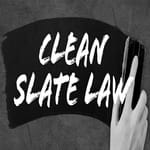 The Virginia Clean Slate Act takes effect on July 1, 2025. It is a law that is about unlocking second chances for millions of people. This new law creates a progressive criminal record relief system that is a mixture of automatic, contemporaneous and petition-based sealing for many criminal convictions and deferred & dismissed criminal dispositions. Currently, there are 12 states that have clean slate laws. Clean slate laws are about unlocking second chances for millions of people. Navigating the complex record-clearing process can prove challenging especially for those who are required to petition a Virginia Circuit Court for relief. Contact our top rated Virginia clean slate law attorneys today for free no obligation consultation!
The Virginia Clean Slate Act takes effect on July 1, 2025. It is a law that is about unlocking second chances for millions of people. This new law creates a progressive criminal record relief system that is a mixture of automatic, contemporaneous and petition-based sealing for many criminal convictions and deferred & dismissed criminal dispositions. Currently, there are 12 states that have clean slate laws. Clean slate laws are about unlocking second chances for millions of people. Navigating the complex record-clearing process can prove challenging especially for those who are required to petition a Virginia Circuit Court for relief. Contact our top rated Virginia clean slate law attorneys today for free no obligation consultation!
Petition for Expungement Attorney Virginia Circuit Court Lawyer
 A Petition for Expungement to erase or seal a Virginia criminal arrest or charge from police and court records is filed in the Circuit Court. The mere filing of a Petition for Expungement does not automatically mean that the petition will be granted and that the criminal record of your case will be erased. Retain the best Virginia Expungement Attorney for your case because the Commonwealth Attorney as respondent for the Commonwealth can object to the Petition. Such an objection does not mean you will lose. Ultimately it is up to the Judge on whether the Petition to Expunge is granted and the police and court records are sealed.
A Petition for Expungement to erase or seal a Virginia criminal arrest or charge from police and court records is filed in the Circuit Court. The mere filing of a Petition for Expungement does not automatically mean that the petition will be granted and that the criminal record of your case will be erased. Retain the best Virginia Expungement Attorney for your case because the Commonwealth Attorney as respondent for the Commonwealth can object to the Petition. Such an objection does not mean you will lose. Ultimately it is up to the Judge on whether the Petition to Expunge is granted and the police and court records are sealed.
Expungement & Sealing Criminal Record Cases Are Adversarial
 If you have been petitioning to have the police and court records of your Virginia criminal case expunged or sealed, then your case will eventually be set before the Circuit Court. These cases are adversarial by design. This involves a structured and formalized dispute between the petitioner and the respondent. The respondent is the Commonwealth of VA. The Commonwealth Attorney represents the commonwealth. The adversarial system is designed to ensure a fair process subject to the rules of law and evidence by allowing each side to present their case and to be able to challenge the other’s arguments and evidence. The Circuit Court Judge ultimately evaluates the evidence & arguments and makes a ruling.
If you have been petitioning to have the police and court records of your Virginia criminal case expunged or sealed, then your case will eventually be set before the Circuit Court. These cases are adversarial by design. This involves a structured and formalized dispute between the petitioner and the respondent. The respondent is the Commonwealth of VA. The Commonwealth Attorney represents the commonwealth. The adversarial system is designed to ensure a fair process subject to the rules of law and evidence by allowing each side to present their case and to be able to challenge the other’s arguments and evidence. The Circuit Court Judge ultimately evaluates the evidence & arguments and makes a ruling.
Virginia Criminal Convictions Can Be Sealed Effective July 2025
 Effective July 1, 2025, certain Virginia “convictions” can be now be sealed. Virginia’s new record sealing law is a big step in the state’s criminal justice system. The law allows for many misdemeanor and felony convictions to be sealed. Some convictions will be automatically sealed. Most cases will require a petition to be filed and presented to the appropriate Virginia Circuit Court Judge. Sealed convictions will no longer be visible to employers, landlords, and others who conduct background checks. This can improve opportunities for employment, housing, and other areas of life. Sealed records are still accessible in some limited circumstances, such as for background checks for firearm purchases or when hiring for police departments and other government agencies.
Effective July 1, 2025, certain Virginia “convictions” can be now be sealed. Virginia’s new record sealing law is a big step in the state’s criminal justice system. The law allows for many misdemeanor and felony convictions to be sealed. Some convictions will be automatically sealed. Most cases will require a petition to be filed and presented to the appropriate Virginia Circuit Court Judge. Sealed convictions will no longer be visible to employers, landlords, and others who conduct background checks. This can improve opportunities for employment, housing, and other areas of life. Sealed records are still accessible in some limited circumstances, such as for background checks for firearm purchases or when hiring for police departments and other government agencies.
Petition Virginia Circuit Court To Seal A Criminal Conviction July 2025
Seal Virginia Misdemeanor Criminal Conviction
Effective July 1, 2025, most misdemeanor convictions except DUI/DWI and domestic assault that are not automatically sealed are eligible to be sealed by petitioning the Virginia Circuit Court where convicted if certain factors are met including the petitioner not having been convicted of a new crime in the seven years after conviction. There are various steps to properly petitioning the Virginia Circuit Court to seal a misdemeanor conviction. The Commonwealth Attorney is the respondent to the petition. The petition to seal a misdemeanor conviction is eventually presented to the Virginia Circuit Court Judge. Allow our top rated Virginia expungement lawyers to help you seal your Virginia misdemeanor criminal conviction.
Seal Virginia Felony Criminal Conviction
Effective July 1, 2025, Class 5 felony convictions, Class 6 felony convictions, and felony larceny convictions (but not certain DUI/DWI offenses) are eligible to be sealed by petitioning the Virginia Circuit Court where convicted if certain factors are met including the petitioner not having been convicted of a new crime in the ten years after conviction. There are various steps to properly petitioning the Virginia Circuit Court to seal certain felony convictions. The Commonwealth Attorney is the respondent to the petition. The petition to seal an eligible felony conviction is eventually presented to the Virginia Circuit Court Judge. Allow our top rated Virginia expungement lawyers to help you seal your Virginia felony criminal conviction.
Seal Virginia Deferred & Dismissed Criminal Records
A deferred disposition is when a Virginia Court withholds imposition of a sentence after a finding that the evidence is sufficient to convict and places conditions on the defendant that will ultimately dismiss the charge. If all the conditions are satisfied, then original charge may be dismissed. The criminal records of a deferred disposition that was dismissed is normally not eligible for expungement except in cases where Va. Code §19.2-298.02 (D) applies. In other cases, such records may be eligible to be sealed come July 2025. The petition to seal the criminal record is eventually presented to the Virginia Circuit Court Judge. Allow our top rated expungement lawyers to help you seal the criminal record of your deferred disposition.
NOTES:
- If the petition is to seal a conviction that involved the use or dependence on alcohol or any narcotic drug, then the Circuit Court must find that the petitioner has been rehabilitated
- A petitioner may only have two petitions to seal a conviction or deferred dismissal granted within his lifetime.
- A petitioner is eligible to seal certain criminal records provided such person has (a) never been convicted of a Class 1 or 2 felony or any other felony punishable by imprisonment for life, (b) not been convicted of a Class 3 or 4 felony within the past 20 years, and (c) not been convicted of any other felony within the past 10 years of the petition.
Automatic Sealing Of Criminal Records July 2025
Automatic Sealing Of Convictions And Deferred Dismissals
Effective July 1, 2025, misdemeanor convictions under the following nine specified Virginia Code sections will be eligible for automatic sealing :
- § 4.1-305 (underage consumption, purchase, or possession of alcohol);
- § 18.2-96 (petit larceny);
- § 18.2-103 (concealing or taking possession of merchandise);
- § 18.2-119 (trespass);
- § 18.2-120 (instigating trespass by others);
- § 18.2-134 (trespass on posted property);
- § 18.2-248.1 (sell/distribute/possess marijuana with the intent to sell/distribute);
- § 18.2-250.1 (possession of marijuana); and,
- § 18.2-415 (disorderly conduct).
Underage possession of alcohol and possession of marijuana offenses that were deferred and dismissed will also be eligible for automatic sealing. The convictions and deferred dismissals cited above will be sealed after seven years from the date of the conviction or the final dismissal, provided that the person has not been convicted of any additional offense in Virginia requiring a report to the Central Criminal Records Exchange (CCRE) or any out-of-state offense, excluding traffic infractions, during that time period.
Exceptions:
- A conviction or deferred dismissal will not be automatically sealed if the person was convicted of another offense that is ineligible for automatic sealing on the same date.
- A conviction or deferred dismissal that was not transmitted to the Central Criminal Records Exchange (CCRE) will not be automatically sealed. In order to automatically seal a criminal record, that record must have been transmitted to the CCRE.
- Possession of marijuana convictions under Virginia Code § 4.1-1100 are not eligible for automatic sealing and cannot be automatically sealed because the defendant is not fingerprinted and a report is not made to the CCRE.
Automatic Sealing Of Non-Convictions
Effective July 1, 2025, certain misdemeanor non-convictions, certain felony non-convictions and offenses resulting from mistaken identity or unauthorized use of identifying information, and traffic infractions will be eligible for automatic sealing. Misdemeanor non-convictions moving forward in time must be ordered to be sealed at the time the court enters the acquittal, nolle prosequi, or dismissal.
The Virginia court does not have to enter an order to seal a misdemeanor non-conviction if any of the following six specific circumstances are brought to the attention of the court:
(1) the charge is ancillary to another charge that resulted in a conviction;
(2) the non-conviction was reached as result of a plea agreement;
(3) another charge arising from the same facts and circumstances is pending against the person;
(4) the Commonwealth intends to reinstitute the charge or any other charge arising out of the same facts and circumstances within 3 months;
(5) the Commonwealth establishes by a preponderance of the evidence that good cause exists to deny the automatic sealing of the charge; or,
(6) the person charged with the offense objects to the automatic sealing.
Felony offenses moving forward in time that conclude in an acquittal or a dismissal with prejudice may be automatically sealed.
Following an acquittal or dismissal with prejudice, the defendant may make an oral motion for sealing, and if the Commonwealth Attorney concurs with the motion, the court must enter an order to automatically seal the offense. If the Commonwealth Attorney does not concur, the felony acquittal or dismissal with prejudice cannot be automatically sealed and the defendant will have to petition for expungement. In addition to addressing certain misdemeanor and felony non-convictions moving forward in time, the sealing legislation created a process to automatically seal certain misdemeanor non-convictions retroactively.
On at least an annual basis, the Virginia State Police must review the CCRE and identify persons with a misdemeanor non-conviction on their criminal history record who
(i) have no other criminal convictions in the CCRE on their criminal history record and
(ii) have no criminal charges in the CCRE on their criminal history record within the past three years.
If these criteria are met, then the misdemeanor non-conviction on the person’s criminal history record shall be automatically sealed.
Any offense moving forward in time that were based on mistaken identity or unauthorized use of identifying information must be ordered to be automatically sealed at the time when a nolle prosequi or dismissal order is entered.
Traffic infractions are automatically sealed after 11 years from the date of final disposition of the offense, unless such records are required to be maintained by the Virginia Department of Motor Vehicles in order to comply with federal law.
Expunged vs. Sealed Records • What Is The Difference?
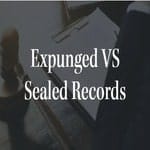 The police and court records of criminal charges and arrests are eligible to be expunged in cases that were finalized by acquittal, nolle prosequi or “otherwise dismissed.” Criminal convictions cannot be expunged. Effective July 2025, many criminal convictions will be eligible to be sealed. The difference between an expunged criminal record and a sealed criminal conviction is subtle and does not make a difference in most cases because both types of records are removed from public access. In either case, the records are not accessible by the public and can only be obtained by court order. Most importantly, regardless of whether a record is sealed or expunged, most employers and landlords will no longer have access to it.
The police and court records of criminal charges and arrests are eligible to be expunged in cases that were finalized by acquittal, nolle prosequi or “otherwise dismissed.” Criminal convictions cannot be expunged. Effective July 2025, many criminal convictions will be eligible to be sealed. The difference between an expunged criminal record and a sealed criminal conviction is subtle and does not make a difference in most cases because both types of records are removed from public access. In either case, the records are not accessible by the public and can only be obtained by court order. Most importantly, regardless of whether a record is sealed or expunged, most employers and landlords will no longer have access to it.
The Differences Between "Expungement" And "Sealing"
The distinction between “expungement” and “sealing” is necessary because criminal convictions covered by the new clean slate “sealing” law carry a variety of consequences that do not apply to “expungable” non-conviction records. For example, a “sealed” felony conviction record may still bar a person from voting, buying a firearm, or getting a security clearance, but the “sealed” record must be accessed to enforce these specific limitations.
Many people think “expungement” of a criminal record means that the record is destroyed. However, according to Virginia law, “expungement” is the process of physically removing the criminal records from a file and filing them in a physically secure location apart from normally accessed files and shielded from public view. Once a criminal record has been “expunged,” it can be accessed in only two situations: 1) when a Commonwealth Attorney provides sufficient cause to a judge that the record is necessary for a pending criminal investigation or 2) there is an employment application to a law enforcement agency. In short, “expunged” criminal records are rarely ever seen again.
On the other hand, “sealing” is the next best thing and restricts dissemination of a person’s police record and prohibits dissemination of a person’s court record. Once a conviction is “sealed” in Virginia, a person can deny the existence of that “sealed” record when asked about it by a potential employer, potential landlord, insurance company, or a state or local government agency. However, there are twenty-five exceptions as provided by Virginia Code § 19.2-392.13.
Some of these exceptions allow law enforcement to access a person’s “sealed” record if the person attempts to purchase a firearm or serve on a jury. Other exceptions allow a court to access a “sealed” record in a child custody or protective order proceeding. There are other exceptions that allow for accessing a “sealed” record such as when a person applies for employment to become a law enforcement officer or a medical examiner.
Expungement Attorneys Argue to Seal Expunge Criminal Record
 Super Lawyers is a rating service of outstanding lawyers from over 70 practice areas – including lawyers that handle expungement matters – who have attained a high-degree of recognition for their achievement. Super Lawyers recognizes the top lawyers in the country from various practice areas and firm sizes using a patented process of independent research and peer input. Our Virginia expungement lawyers have been recognized as Virginia Super Lawyers since 2009. No more than five percent of the lawyers in a state are named to Super Lawyers and no more than 2.5 percent are named to the Rising Stars list. This recognition is merit based. Retain a Virginia expungement attorney who has been recognized by Super Lawyers.
Super Lawyers is a rating service of outstanding lawyers from over 70 practice areas – including lawyers that handle expungement matters – who have attained a high-degree of recognition for their achievement. Super Lawyers recognizes the top lawyers in the country from various practice areas and firm sizes using a patented process of independent research and peer input. Our Virginia expungement lawyers have been recognized as Virginia Super Lawyers since 2009. No more than five percent of the lawyers in a state are named to Super Lawyers and no more than 2.5 percent are named to the Rising Stars list. This recognition is merit based. Retain a Virginia expungement attorney who has been recognized by Super Lawyers.
Seal VA Criminal Records for Privacy and Professional Reasons
 Our attorneys understand that the police and court records of your VA criminal case includes sensitive information. That sensitive information may still be visible in court and police records even if the case was dismissed. Many clients elect to seal the police and courts records of their criminal cases if they have the opportunity. Do not lose an educational, professional or housing opportunity – if possible – because of a criminal charge that did not result in a conviction. The law prohibits an employer or educational institution from requiring an applicant to disclose information concerning a criminal charge that has been expunged. Contact a top rated VA Expungement Lawyer for help with your case.
Our attorneys understand that the police and court records of your VA criminal case includes sensitive information. That sensitive information may still be visible in court and police records even if the case was dismissed. Many clients elect to seal the police and courts records of their criminal cases if they have the opportunity. Do not lose an educational, professional or housing opportunity – if possible – because of a criminal charge that did not result in a conviction. The law prohibits an employer or educational institution from requiring an applicant to disclose information concerning a criminal charge that has been expunged. Contact a top rated VA Expungement Lawyer for help with your case.
Benefits of Expunged Virginia Criminal Record & Sealed Criminal Convictions
 An expunged criminal record or sealed criminal conviction effective July 2025 are no longer publicly viewable and do not show up in employment background checks, housing applications, education forms, credit scores, etc. Expunged criminal records are not even visible to law enforcement. The expungement or sealing of a criminal record greatly increases the chances of being hired or obtaining housing because it prevents a potential employer or landlord from seeing the criminal record of an applicant. The stigma of a criminal record is enough to discourage more than half of employers and landlords from hiring and leasing to someone.
An expunged criminal record or sealed criminal conviction effective July 2025 are no longer publicly viewable and do not show up in employment background checks, housing applications, education forms, credit scores, etc. Expunged criminal records are not even visible to law enforcement. The expungement or sealing of a criminal record greatly increases the chances of being hired or obtaining housing because it prevents a potential employer or landlord from seeing the criminal record of an applicant. The stigma of a criminal record is enough to discourage more than half of employers and landlords from hiring and leasing to someone.
Deferred Criminal Case Dismissals & Expungement Eligibility
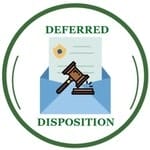 In some instances, a Virginia trial court will defer proceedings in a criminal case for final disposition. In 2020, the law changed and now allows for expungement eligibility when, upon agreement of all parties, a charge that is dismissed pursuant to Va. Code § 19.2-298.02 (D), including an original charge that was reduced or a charge that is dismissed after a plea or stipulation of the facts that would justify a finding of guilt, may be considered as “otherwise dismissed” for purposes of expungement of police and court records in accordance with Va. Code § 19.2-392.2, when such agreement of all parties indicates such expungement eligibility in the final disposition order.
In some instances, a Virginia trial court will defer proceedings in a criminal case for final disposition. In 2020, the law changed and now allows for expungement eligibility when, upon agreement of all parties, a charge that is dismissed pursuant to Va. Code § 19.2-298.02 (D), including an original charge that was reduced or a charge that is dismissed after a plea or stipulation of the facts that would justify a finding of guilt, may be considered as “otherwise dismissed” for purposes of expungement of police and court records in accordance with Va. Code § 19.2-392.2, when such agreement of all parties indicates such expungement eligibility in the final disposition order.
Legal Elite Virginia Expungement Attorney Recognized by VA Business
 The Virginia Business publication is dedicated to covering the legal community of the Commonwealth including expungement attorneys. Since 2000, VA Business, in cooperation with the Bar Association, annually recognizes the Top Attorneys with its Legal Elite award. There are over 23,000 legal practitioners in the Commonwealth. Legal Elite recognitions are awarded to approximately 1400 attorneys each year. This is an exclusive list of top rated individuals who have been recognized by their peers for excellence. Only outstanding and experienced professionals are recognized for being Legal Elite. A practitioner cannot purchase their way in to being recognized as a member of the Legal Elite community. Contact our top rated expungement lawyers about your case.
The Virginia Business publication is dedicated to covering the legal community of the Commonwealth including expungement attorneys. Since 2000, VA Business, in cooperation with the Bar Association, annually recognizes the Top Attorneys with its Legal Elite award. There are over 23,000 legal practitioners in the Commonwealth. Legal Elite recognitions are awarded to approximately 1400 attorneys each year. This is an exclusive list of top rated individuals who have been recognized by their peers for excellence. Only outstanding and experienced professionals are recognized for being Legal Elite. A practitioner cannot purchase their way in to being recognized as a member of the Legal Elite community. Contact our top rated expungement lawyers about your case.
Virginia Expungement Attorney Explains “Otherwise Dismissed”
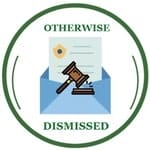 There are three case outcomes that are eligible for expungement in the Commonwealth: acquittal, nolle prosequi and “otherwise dismissed”. The legal definitions of acquittal and nolle prosequi are clear, but the phrase “otherwise dismissed” is not defined in the expungement statute and has been debated by Virginia courts for decades. Virginia courts have ruled that “otherwise dismissed” includes charges dismissed without any finding that the evidence was sufficient to establish guilt. Virginia courts have also held that “otherwise dismissed” does not include charges dismissed after completion of a first offender program, charges concluded in a plea of nolo contendere, and charges dismissed following a defendant being found not guilty by reason of insanity.
There are three case outcomes that are eligible for expungement in the Commonwealth: acquittal, nolle prosequi and “otherwise dismissed”. The legal definitions of acquittal and nolle prosequi are clear, but the phrase “otherwise dismissed” is not defined in the expungement statute and has been debated by Virginia courts for decades. Virginia courts have ruled that “otherwise dismissed” includes charges dismissed without any finding that the evidence was sufficient to establish guilt. Virginia courts have also held that “otherwise dismissed” does not include charges dismissed after completion of a first offender program, charges concluded in a plea of nolo contendere, and charges dismissed following a defendant being found not guilty by reason of insanity.
"Factual-Relatedness" & “Completely Separate and Unrelated Charges" Tests
Sometimes the defendant is convicted of a different offense than the one with which they were originally charged. If the defendant was convicted of a lesser-included offense (i.e., a person originally charged with felony assault on law enforcement but convicted of misdemeanor assault and battery), then the dismissed charge of felony assault on law enforcement was not “otherwise dismissed” and thus not ineligible for expungement.
On the other hand, if the defendant was convicted of a non-lesser-included offense, then the original dismissed charge was “otherwise dismissed” and would be eligible for expungement. For example, if a charge of possession of marijuana which was amended to and resulted in a reckless driving conviction, then the dismissed possession of marijuana charge was “otherwise dismissed” and would be eligible for expungement. Old Virginia law allowed for a “partial expungement” where the initial charge could be expunged, but not the ultimate conviction.
In 2023, the Supreme Court of Virginia created a new “completely separate and unrelated” charges test to determine “otherwise dismissed” in cases where the defendant was convicted of a different offense than the one originally charged. The Circuit Courts must now use a two-part test which requires a court to “(1) compare the conceptual similarities and differences between the original charge and the amended charge and (2) examine whether the two charges share a common nucleus of operative facts.”
This new test is more complex than the previous analysis. The new test is not part of Virginia’s expungement statute. It is a creation of the Virginia Supreme Court. No other state in the country with an expungement statute that contains the term “otherwise dismissed” requires any kind of “factualrelatedness test” to determine the connection between the original charge and the conviction. The concurring opinion concludes by actually asking the General Assembly to clarify the term “otherwise dismissed” in the expungement statute.
What is an acquittal?
An acquittal means that the prosecution has failed to prove that the accused is guilty beyond a reasonable doubt of the charge presented. An acquittal does not mean the defendant is innocent of the charge presented—only that the prosecutor failed to prove that the defendant was guilty beyond a reasonable doubt. It certifies that the accused is free from the criminal offense charged. An acquittal prohibits the retrial of the accused for the same offense, even if new evidence surfaces that further implicates the accused.
The effect of an acquittal on criminal proceedings is the same whether it results from a either a judge verdict or a jury verdict. The prosecution cannot appeal an acquittal. The arrest or charge remains on the defendant’s criminal record even after an acquittal unless expunged. A criminal record can be expunged in cases where an arrest later resulted in an acquittal.
What is nolle prosequi?
Nolle prosequi somestimes abbreviated nolle pros is a legal Latin term that means “to be unwilling to pursue”. Motions to nolle prosequi criminal cases are made at the prosecutor’s discretion. It is the prosecutors’ declaration that they are voluntarily ending and that they are declining to further pursue the case against the defendant. A prosecutor’s motion to nolle prosequi a criminal case is usually made before trial begins. The defendant may later be indicted on the same charge again and stand trial since the principle of double jeopardy does not apply. The entry of a nolle prosequi is not an acquittal.
There are several reasons why the prosecution may nolle prosequi a criminal case. Prosecutor motions to nolle pros might be made due to a plea agreement or because the prosecutor becomes doubtful that the defendant is guilty, the charges cannot be proved beyond a reasonable doubt, necessary witnesses are either not available or uncooperative, the defendant’s innocence has been proven, the defendant has died or the prosecutor is content that the sentence on other charges is sufficient and there is no need to go any further with the original case. An arrest or charge that is nolle prosequi is eligible to be expunged.
New Expungement Common Nucleus of Operative Fact Standard
 In some expungement cases, the petitioner wants to expunge an arrest where the outcome resulted in a conviction for a different offense. The Supreme Court of Virginia created a new expungement test in 2023 for this scenario that is not petitioner friendly. The Court created a “common nucleus of operative facts” standard. The Circuit Court is to (1) compare the conceptual similarities and differences between the original charge and the amended charge and (2) examine whether the two charges share a common nucleus of operative facts. The new test requires the Circuit Court to return to the underlying facts of the criminal case(s) and inquire into whether the amended charge arose from similar facts to the original charge.
In some expungement cases, the petitioner wants to expunge an arrest where the outcome resulted in a conviction for a different offense. The Supreme Court of Virginia created a new expungement test in 2023 for this scenario that is not petitioner friendly. The Court created a “common nucleus of operative facts” standard. The Circuit Court is to (1) compare the conceptual similarities and differences between the original charge and the amended charge and (2) examine whether the two charges share a common nucleus of operative facts. The new test requires the Circuit Court to return to the underlying facts of the criminal case(s) and inquire into whether the amended charge arose from similar facts to the original charge.
Manifest Injustice To Expunge Criminal Record And Seal Convictions
 Virginia petitions to expunge a criminal record and petitions to seal a criminal conviction beginning in July 2025 require the continued existence and possible dissemination of information relating to the arrest or conviction (whichever applies) of the petitioner causes or may cause circumstances which constitute a manifest injustice. The “manifest injustice” standard is a permissive forward looking test and not a backward looking test, but it is not available to every petitioner who seeks to have an eligible record expunged. The inquiry turns on whether the continued existence of the record will or may cause the petitioner a manifest injustice in the future. A petitioner with a lengthy unexpungeable criminal record will generally have a more difficult “manifest injustice” argument.
Virginia petitions to expunge a criminal record and petitions to seal a criminal conviction beginning in July 2025 require the continued existence and possible dissemination of information relating to the arrest or conviction (whichever applies) of the petitioner causes or may cause circumstances which constitute a manifest injustice. The “manifest injustice” standard is a permissive forward looking test and not a backward looking test, but it is not available to every petitioner who seeks to have an eligible record expunged. The inquiry turns on whether the continued existence of the record will or may cause the petitioner a manifest injustice in the future. A petitioner with a lengthy unexpungeable criminal record will generally have a more difficult “manifest injustice” argument.
Superb Avvo Rated Virginia Expungement Attorneys
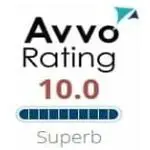 The Avvo Lawyer Rating can help you find the right Virginia expungement lawyer to help you expunge a criminal record or seal certain convictions starting in July 2025. Avvo is a legal directory that rates legal professionals using a mathematical model on a scale of 1 (Extreme Caution) to 10 (Superb). Our Virginia expungement attorneys maintain a 10.0 Superb Avvo rating. Avvo collects relevant information from state bar associations, other organizations that license Virginia lawyers, legal professionals and thousands of consumers to calculate its rating. The same set of standards are used for every lawyer that is evaluated. The Avvo rating is merit based. You cannot pay a fee to improve your Avvo rating.
The Avvo Lawyer Rating can help you find the right Virginia expungement lawyer to help you expunge a criminal record or seal certain convictions starting in July 2025. Avvo is a legal directory that rates legal professionals using a mathematical model on a scale of 1 (Extreme Caution) to 10 (Superb). Our Virginia expungement attorneys maintain a 10.0 Superb Avvo rating. Avvo collects relevant information from state bar associations, other organizations that license Virginia lawyers, legal professionals and thousands of consumers to calculate its rating. The same set of standards are used for every lawyer that is evaluated. The Avvo rating is merit based. You cannot pay a fee to improve your Avvo rating.
VA Expungement Lawyer Sealing a Criminal Record Granted by Judge
 In this case, our client was accused of soliciting a prostitute. The client’s criminal case was filed with the General District Court. Our expungement attorneys convinced the District Court Judge to enter an order that dropped the case. We then filed a Petition for Expungement in the Circuit Court. A Circuit Court Judge presided on our Petition. The Judge was convinced with the evidence and arguments of our petition. The Circuit Court granted the petition and ordered the police and court records of our client’s case to be expunged or sealed. Click on image to see court order. NOTE: Private background check companies may possess records related to cases that have now been expunged.
In this case, our client was accused of soliciting a prostitute. The client’s criminal case was filed with the General District Court. Our expungement attorneys convinced the District Court Judge to enter an order that dropped the case. We then filed a Petition for Expungement in the Circuit Court. A Circuit Court Judge presided on our Petition. The Judge was convinced with the evidence and arguments of our petition. The Circuit Court granted the petition and ordered the police and court records of our client’s case to be expunged or sealed. Click on image to see court order. NOTE: Private background check companies may possess records related to cases that have now been expunged.
Let us review YOUR case. We can help!
5/1/2021 | Updated 2/16/2025
